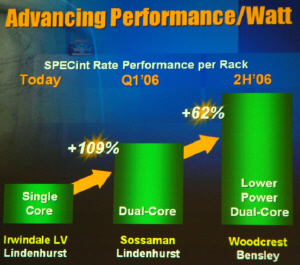Will Intel crush AMD next year?

Intel honcho and head of the Digital Enterprise Group Pat Gelsinger made some promises or at least bold statements (with mentioning rival AMD by name) at IDF this week. He said that Intel would "unquestionably be the performance per watt leader in 2006." He also said, "We [Intel] will have absolute leadership in the market next year."
I asked Nathan Brookwood of Insight 64 whether Gelsinger's prediction was on the mark. "It's a bit early to say whether Intel will close the gap with AMD. Today Intel is at a disadvantage in performance per watt, but it could surpass AMD at the end of next with the new generation of processors (see the chart below from Intel)."

It's not clear how Gelsinger and Intel will measure "absolute leadership." It can't be just revenue or overall share. That's already a no contest. How about technical leadership and momentum?
On the performance front, AMD's Opterons have an advantage that Intel can't easily overcome. Unlike AMD's dual core processors, Intel's forthcoming processors don't have an integrated, on-board memory controller, which increases performance. With memory closer to the processor, speeds can increase by around 10 percent for a uniprocessor system and up to 50 percent on a two-processor system. Users who need the maximum performance will still look to AMD, despite a massive marketing campaigns that Intel will launch as the chip roll out in the second half of next year. At some point, Intel will have a new system interface with on board memory for each processor or some other technology innovation, but the company isn't talking about it.
For the foreseeable dual-core future, you might have a choice between saving a bit more on energy costs and battery life via Intel vs. maximized performance from AMD. But it's never really that simple. Intel hasn't shown all its cards, and AMD won't be standing still while Intel does its x86 course corrections...